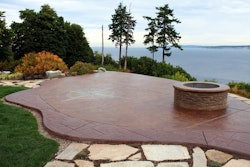Here are some top reasons why more Hispanic students should learn about landscape architecture and become landscape architects, according to the American Society of Landscape Architects (ASLA).
1. Landscape architecture is a rewarding career that combines art, science and the environment.
Landscape architects design all types of outdoor public and private spaces that help define a community, including parks, landmarks and residential landscapes. Landscape architects have a significant impact on communities and quality of life. To learn more, visit ASLA’s career discovery page.
2. Landscape architects are leading community change, so they need to represent the diverse groups who make up the U.S. population.
"Landscape architects' work is integral to the health and well-being of our nation's communities," says ASLA President Chad D. Danos, FASLA. "That's why it's so important that they understand the people for whom they're designing."
The U.S. population will be much more racially and ethnically diverse by 2060, according to projections by the U.S. Census Bureau. The Hispanic population will more than double, from 53.3 million in 2012 to 128.8 million in 2060. Consequently, by the end of the period, nearly one in three U.S. residents will be Hispanic, up from about one in six today.
3. Landscape architects design outdoor spaces where people enjoy recreation, cultural events and family gatherings.
According to the Hispanic Access Foundation, Hispanics are passionate about their public parks and open spaces. Austin, Texas-based landscape architect Luis G. Hidalgo, ASLA, agrees. Hidalgo volunteered to participate in an annual diversity summit hosted by the American Society of Landscape Architects (ASLA) to brainstorm ways to help K-12 minority students, including those of Hispanic origin, discover landscape architecture.
Says Hidalgo, "As a landscape architect, I have a great opportunity to bring my love of the outdoors and active living into my design projects. I’m proud to be part of a group of professionals that shape and transform the social, physical and community environment that affect our daily activities."
4. Landscape architects from Hispanic backgrounds bring unique perspectives to the design table.
"Landscape architects have an amazing opportunity to help shape and transform the social, physical and community environments that affect our daily activities," says Austin, Texas-based landscape designer Melissa Henao-Robledo, ASLA, who also participated in ASLA’s diversity summit. "Hispanic landscape architects offer a unique perspective because so few of us are sitting at the design table.”
Henao-Robledo also points out the tremendous diversity found within the Hispanic community; therefore, in order to prevent stereotypes, a broad representation of Latinos within the industry would be ideal.
5. Landscape architects create iconic parks, streetscapes, and other public spaces that give cities an identity.
Famed Brazilian landscape architect Roberto Burle Marx—who in 1970 redesigned the renowned Avenida Atlantica along Rio de Janeiro's Copacabana Beach—was among the media stars of this year's Summer Olympic Games. Millions of people around the world watching the closing ceremony saw dancers pay tribute to Marx, and such media outlets as the Los Angeles Times, New York Times and Wall Street Journal wrote about his legacy.
6. Landscape architects follow many paths before discovering the landscape architecture profession.
ASLA encourages teachers and families to explore its career discovery resources. Spanish-language materials include an introduction to the profession and Society on the ASLA website and fact sheet.
Founded in 1899, the American Society of Landscape Architects is the national professional association for landscape architects, representing more than 15,000 members in 49 professional chapters and 72 student chapters. Members of the Society use "ASLA" after their names to denote membership and their commitment to the highest ethical standards of the profession. Landscape architects lead the stewardship, planning and design of our built and natural environments; the Society’s mission is to advance landscape architecture through advocacy, communication, education and fellowship.


















